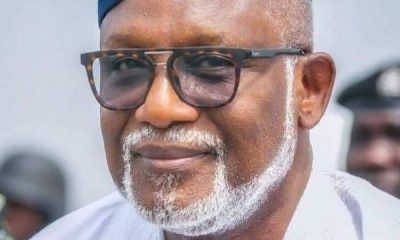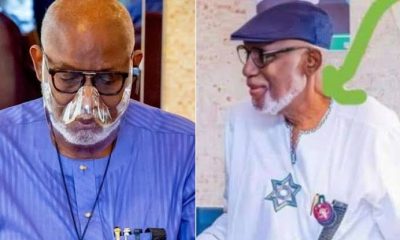Headline
BREAKING: Ondo Governor, Akeredolu is dead

The Ondo State Governor, Rotimi Akeredolu, is dead.
A family source told SaharaReporters on Wednesday that Akeredolu died in Lagos.
FELLOW PRESS learnt that he was managed by State House doctors up to his death because they could not fly him abroad.
“Akeredolu is dead; he died in Lagos,” the source said.
“They were looking for dialysis machines to be sent to his secret location in Lagos last week.”
He was 67 years old.
The ailing governor returned to Nigeria in September following a three-month medical leave in Germany and only recently proceeded on another one after he was directed by President Bola Tinubu to hand over power to his deputy, Lucky Aiyedatiwa.
His deputy, Aiyedatiwa has been standing in as Acting Governor.
Following his return to Nigeria in September, Akeredolu stayed in Ibadan, the Oyo State capital and tried to govern his state from there, leading to public outrage.
On July 9, Akeredolu’s wife, Betty announced the suspension of activities lined up to celebrate her 70th birthday.
The Ondo first lady announced the suspension of the activities in Twitter posts after questions were raised over plans to have a fanfare despite her husband’s ill health.
“Hello Family and Friends. This is to inform you that all activities lined up to mark my 70th birthday are hereby suspended till further notice due to unforeseen circumstances beyond my control. Sorry for any inconvenience caused by this development.”
“Nevertheless, be assured that I will be celebrated in style upon my return. Thank you for your understanding. I remain Arabinrin a.k.a Ada Owere I,” she tweeted.
SaharaReporters exclusively reported in January that Akeredolu was treating leukemia.
“The governor of Ondo State, Rotimi Akeredolu has leukemia, he is really down,” one of the sources in the Alagbaka Government House revealed at that time.
Leukemia is a cancer of the blood caused by a rise in the number of white blood cells in the body.
For sufferers, the white blood cells crowd out the red blood cells and platelets needed by the body to stay healthy.
White blood cells are potent infection fighters which grow and divide in an orderly way, as the body needs them. But in people with leukemia, the bone marrow produces an excessive amount of abnormal white blood cells, which don’t function properly.
It is a cancer of blood-forming tissues that hinders the body’s ability to fight infections.
The types that exist include acute lymphoblastic leukemia, acute myeloid leukemia and chronic lymphocytic leukemia.
Treatment for leukemia can be complex depending on the type of leukemia and other factors.
However, some strategies and resources can help make treatment successful.
According to WebMD Cancer Center, its symptoms may include weakness or fatigue, bruising or bleeding easily, fever or chills, infections that are severe or keep coming back, and pain in your bones or joints.
Others may include headaches, vomiting, seizures, weight loss, night sweats, shortness of breath, and swollen lymph nodes or organs like the spleen.
Headline
EFCC bars dollar transactions, orders embassies to charge in naira

The Economic and Financial Crimes Commission has barred foreign missions based in Nigeria from transacting in foreign currencies and mandated them to use Naira in their financial businesses.
The EFCC has also mandated Nigerian foreign missions domiciled abroad to accept Naira in their financial businesses.
The anti-graft agency said the move is to tackle the dollarisation of the Nigerian economy and the degradation of the naira
The Commission, therefore, asked the government to stop foreign missions in Nigeria from charging visa and other consular services in foreign denominations.
The EFCC gave the advisory in a letter to the Minister of Foreign Affairs, Amb. Yusuf Tuggar, for onward transmission to all foreign missions in the country.
In the letter, the EFCC said it issued the advisory because the practice of paying for consular services in dollars was in conflict with extant laws and financial regulations in Nigeria.
In a letter dated April 5, 2024, which was addressed to the Minister of Foreign Affairs, Ambassador Yusuf Tuggar, titled: “EFCC Advisory to Foreign Missions against Invoicing in US Dollar,” the EFCC Chairman, Ola Olukoyede expressed dismay over the invoicing of consular services in Nigeria by foreign missions in dollars.
The EFCC cited Section 20(1) of the Central Bank of Nigeria Act, 2007, which makes currencies issued by the apex bank the only legal tender in Nigeria.
The letter read, “I present to you the compliments of the Economic and Financial Crimes Commission, and wish to notify you about the commission’s observation, with dismay, regarding the unhealthy practice by some foreign missions to invoice consular services to Nigerians and other foreign nationals in the country in United States dollar ($).
“It states that ‘the currency notes issued by the Bank shall be the legal tender in Nigeria on their face value for the payment of any amount’.
“This presupposes that any transaction in currencies other than the naira anywhere in Nigeria contravenes the law and is, therefore, illegal.”
The commission further stated that the rejection of the naira for consular services in Nigeria by certain missions, along with non-compliance with foreign exchange regulations in determining service costs, is not just unlawful but also undermines the nation’s sovereignty embodied in its official currency.
The letter continues: “This trend can no longer be tolerated, especially in a volatile economic environment where the country’s macroeconomic policies are constantly under attack by all manner of state and non-state actors.
“In light of the above, you may wish to convey the commission’s displeasure to all missions in Nigeria and restate Nigeria’s desire for their operations not to conflict with extant laws and regulations in the country.”
Diplomatic sources said yesterday, May 10, that some embassies were wondering whether the EFCC’s advisory represented the position of the Federal Government.
Headline
Prince Harry visits sick Nigerian soldiers in Kaduna

Prince Harry and his team visited the 44 Nigerian Army Reference Hospital in Kaduna to interact with wounded soldiers who are receiving treatment.
The Duke of Sussex is in Nigeria with his wife to champion the Invictus Games, which Harry founded to aid the rehabilitation of wounded and sick servicemembers and veterans.
Nigeria joined the Invictus Community of Nations in 2022 becoming the first African country to join.
Prince Harry’s visit to Kaduna came 68 years after his late grandmother Queen Elizabeth II visited the state during the time of the late Premier of Northern Region Sir Ahmadu Bello.




-

 Headline5 days ago
Headline5 days agoSuspend cybersecurity levy– Reps to CBN
-

 Business5 days ago
Business5 days agoNigeria needs over $2bn to revive Ajaokuta Steel Plant, says Minister
-

 Headline3 days ago
Headline3 days agoPrince Harry visits sick Nigerian soldiers in Kaduna
-

 Entertainment3 days ago
Entertainment3 days agoAMVCA Cultural Day: BBNaija’s Neo, Venita win Best Dressed Male, Female
-

 Headline5 days ago
Headline5 days agoTinubu resumes work after foreign trip
-

 News5 days ago
News5 days agoShan George’s money returned to Zenith Bank account
-

 Metro3 days ago
Metro3 days agoEx-Sports Minister laments after hospital neglected him for hours over N80000 deposit









